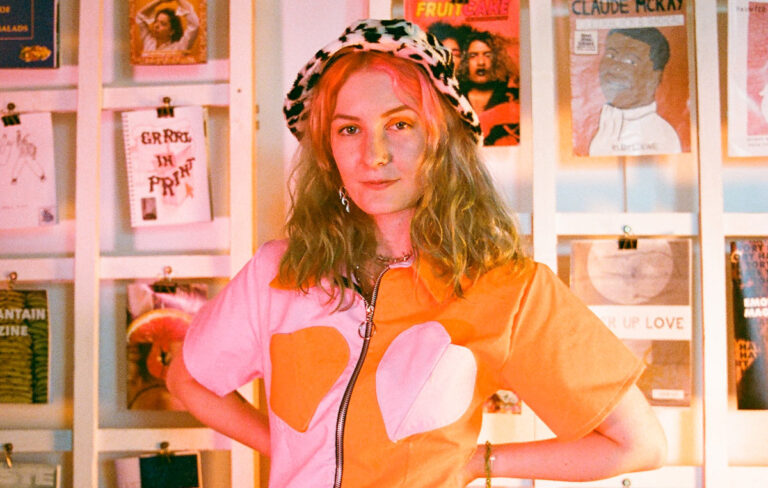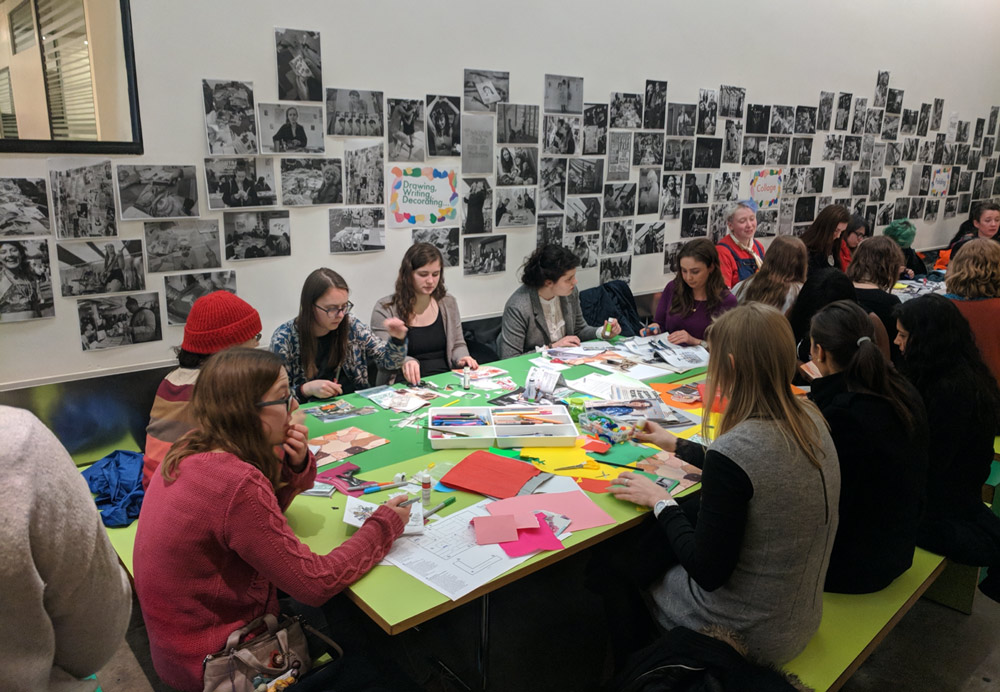Feminist Zine Club: a night of zine-making, reading and poetry with Grrrl founder Lu Williams

By Alma Fabiani
Published Jul 8, 2021 at 01:43 PM
Reading time: 4 minutes
In partnership with Selina

As one of the ten winners of The Special Event Call Out we launched in partnership with Selina, Grrrl’s founder Lu Williams is here to invite you Feminist Zine Club, an evening consisting of a zine-making workshop, dinner and drinks, followed by zine readings and poetry. Ahead of the event, which will take place on Monday 19 July at Selina’s new Camden location, we spoke to Williams about their love for zines and exactly what potential attendees should expect.
Making zines accessible
“I started Grrrl when I was at university and part of Cuntry Living Zine,” Williams first told us when speaking about their journey as a zine enthusiast. “Coming from a working-class family in Essex and studying Fine Art at Oxford university was in parts amazing and in parts isolating because it was hard to connect and buy into the whole institutional vibe.”
If you’ve never heard of Cuntry Living Zine before, it is a feminist publication that has been going about for around 15 years, “with each editorial group handing it down to the next batch of feminist activists wanting to explore ideas and make a zine.” The group produces three zines per year alongside running club nights and events to highlight the skills of female and non-binary performers, creators and organisers. “I realised the power of zines at this point and put on the first fair with a group of friends in an old church in Oxford, essentially to bring together other zine makers,” Williams continued.
After graduating, Williams kept on going by organising fairs in London, by which point “the ball started rolling.” They further explained that they like to approach zines from an artist’s lens—seeing zine-making as an accessible way to disseminate ideas and artworks while empowering the makers. “I believe anyone can make a zine and has something to share with the world, so zines are an amazing vehicle to do just that.”
A workshop professional
Grrrl curates and creates events that span across the creative industries. Mixing art, publishing, music, performance and film, Grrrl platforms voices marginalised by mainstream media. And if there is one thing that Williams is known for, it’s their zine fairs and workshops. “I’ve run workshops and toured the Grrrl Zine Library, which is a 500 issue strong installation/archive of feminist voices. The library has been in situ at Times Museum in China, Ireland’s Literature Festival, the V&A Museum and the British Film Institute. The beauty of it is it takes up space as well as providing people a place to sit, read and explore thousands of voices and artworks made by queer feminists.”

Alongside their fairs, Williams runs zine-making workshops dedicated to people who, after flicking through the zines on display at the fair, feel the need to try their own hand at the creative craft. For Feminist Zine Club, Williams is planning on starting the evening with the same idea, “I’ll be bringing a selection of zines along for people to explore and then we’ll crack on and make our own. You don’t need to bring an idea as we’ll be brainstorming together and I can show you some tried and tested writing techniques to get your imagination flowing.” No brainstorming needed prior to the event then!
On top of creating your own DIY self-published magazine and bringing it home with you, you’ll get to take part in important discussions about the future of feminism and how zines can help share uncensored information, document culture, and platform the work of women as well as marginalised genders. When asked what a feminist future looks like to them, Williams told us, “A world that acknowledges how we depend on the health of our planet to survive and the mental wellbeing and safety of women, trans and non-binary people on Earth.”
They continued, “A feminist future looks like safety for all genders, compassion and collaboration between individuals, prioritising wellbeing over capital. I see it as fair pay for everyone and a dismantling of harmful power structures such as colonialism, patriarchy and homophobia which are ideologies and ways of being which negatively affect the most vulnerable in society.” And how can we give a platform to the varied voices working towards creating a feminist future? By making and displaying zines.
“Picking up a zine and reading first-hand ideas, experiences and discovering the imagination of other individuals who you don’t hear about in mainstream media is so liberating. I think there is an innate desire for humans to want to document their existence—through art, culture, Instagram—but zines are a way of doing the same without having to have a million followers, a book deal or an agent. Some of the most powerful zines I’ve read are from people documenting their experience with mental health, late diagnosis of autism, a celebration of ‘normal’ bodies and history of LGBTQIA+ people. It’s incredibly validating to read a zine written by someone with a similar experience to you, and making your own is just as empowering. Trust me, you’ll be hooked.”
So, what about when you’re done creating your own zine during Williams’ Feminist Zine Club? “I’ve curated a selection of writers, poets, musicians, stylists and artists who self publish and use zines as a way to share their art and knowledge with the world. The readings are all from LGBTQIA+ feminist creatives. We’ll also have some time for readings from the audience if anyone wants to share what they’ve made in the workshop or share material from a zine they’ve just launched.” If you’d like to take part, Williams encouraged those interested to send them an email at [email protected].
The event is open to everyone who is respectful of a feminist safe space. “This means there’s no judgement and you’re welcome to try out ideas, no matter how silly or serious!” You can already get your ticket for Williams’ zine workshop for £11 here. If you’d like to enjoy a meal at Selina’s POWERPLANT restaurant afterwards, you can get a prepaid menu for £42.50 here. And if you’re interested in joining later on for the readings, all you need to do is RSVP for free here.
And for those of you who aren’t 100 per cent convinced just yet, here’s what Williams finished our conversation with, “If you need inspiration and would like to drink some Male Tears, then come along for the evening where we’ll be joined by creatives sharing work from their own zines alongside yummy cocktails.”




